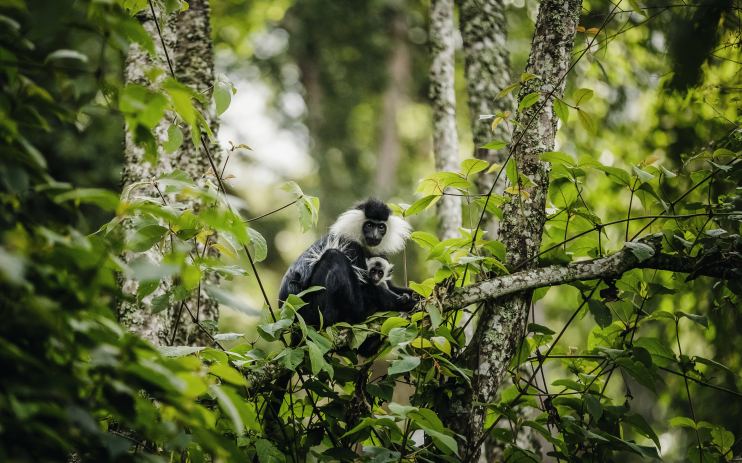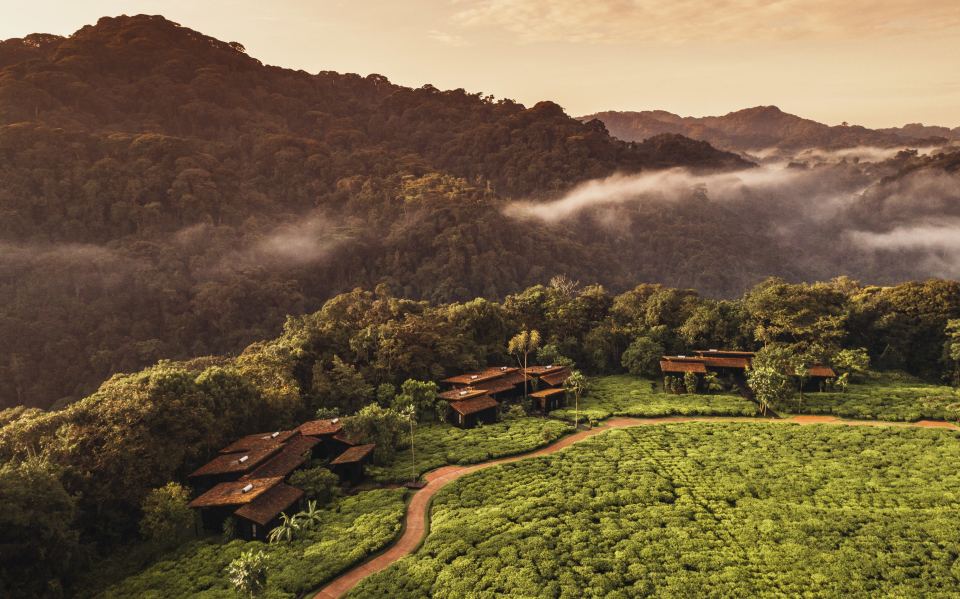Chimp-trekking and clifftop archery in Rwanda

I’m on my hands and knees, mud-caked and scratched to pieces, while a sticky-legged insect is meandering its way down the back of my neck. Somewhere in front of me I can hear the gentle snick snick of machetes slicing through corkscrew ferns and above me murky sunlight bleeds through the thick forest canopy. I try to pull myself upright but my limbs flail, entangled in vines like grasping, witchy fingers. I wipe the dirt from my brow and freeze. A sound comes loud and shrill and nerve-jangling: a deafening screech that cuts through the trees with a shiver.
I’m searching for chimpanzees in Rwanda’s Nyungwe Forest and, although exhilarating, it’s not particularly elegant. I’ve already fallen down a hole which swallowed my entire right leg, bust my knee scrambling up a rocky precipice, and sweat is rivering from my lower back down into my trousers. But I’m not stopping now. We’ve been hiking for four hours, heaving past thousand-year-old ficus trees, clawing through stringy silver cobwebs and stepping over armies of fire ants marching in formation across the forest floor. Nyungwe is home to some weird and wonderful creatures – from dazzling blue turaco birds to spindly-limbed golden cats. But it’s chimpanzees that we’ve really got our eyes (and ears) open for.

We set out at dawn, the amber sun glowering like a moody teenager through pistol-dark clouds and are gruffly furnished with hiking sticks and ankle gaiters (to protect our feet from the ants). The terrain can be tough and, unlike the fairly docile mountain gorillas in Volcanoes National Park (most people’s reason for visiting Rwanda), these creatures like to move, so it’s likely, if we do spot them, we’ll be taken on a wild goose chase through the forest. That last point in particular has proven itself to be very true, and while we hear plenty of chimps – hooting and bellowing and screeching like carnival goers – we’ve not got close enough to see any. Yet.
Soon enough I’m up on my feet again and I begin the painstaking process of inching my limbs through the thick vegetation, when suddenly the forest opens up, and members of the group in front of me come to a stop. There’s nothing but silence, the forest holding its breath, until it’s broken by the spreading of a slow grin across a ranger’s face. He points a finger upwards and we raise our heads in unison. Above us is a dark mass of hair, squashed neatly in the crook of a tree. It can’t be. Suddenly: a small thud, then another, then another, the forest floor speckling with half-eaten fruit. More scratching from above then the whole canopy comes alive; a family of chimpanzees seem to materialise out of nowhere, swooshing through the trees. As we watch, slack-mouthed, they munch on termites, groom one another with long slender fingers and most thrillingly of all hurl themselves to the forest floor with almighty screeches. It’s mind-boggling to think that these creatures share 98.6 per cent of our DNA and makes me wonder why tourists spend thousands of pounds plodding towards habituated mountain gorillas further north when you can see these astonishing creatures, free from the crowds, for around $100 a permit.
But chimp trekking isn’t the only way to work up a sweat. Nearby, at the magnificent One & Only Nyungwe House there’s a smorgasbord of activities that allow you to keep fit while enjoying the great outdoors. It’s a bit of a schlep to get here, mind – a five-hour drive from the capital, Kigali – but the scenery is worth it. They don’t call Rwanda the “country of a thousand hills” for nothing; roads are relentlessly windy, hugged by lush banana, cassava and tea plantations and watched over by huge Triffid-like leaves. Protected forests are patrolled by heavily-armed guards in camo, and mountain monkeys sit at the side of the road like whiskered old men. As we weave through villages, children play football or stride home from school in neat uniforms. It’s all a far cry from Rwanda’s horrifying genocide history, respectful nods to which are still present throughout the country.
Nyungwe House is a tranquil place. Surrounded by apple-green tea plantations spilling across the hills and bordering the Nyungwe Forest itself (in-house Leica scopes allow you to baboon-spot from your breakfast table), it’s the sort of mist-cloaked place where time seems to stand still. Rooms face directly out onto the forest (don’t be surprised to spot long-limbed colobus monkeys at sunrise) and a stay here is all about immersing yourself in nature.
Joseph is the man when it comes to fitness. Spear-throwing sessions come with tea plantation views and searing rotator cuff muscles. Slightly easier is the archery, which I take to like a short woman with very little upper body strength (my aim happens to be excellent, though). Those who wish to get even sweatier can give the high-altitude forest boot camp sessions a whirl – you’ll run from tea hut to tea hut, dropping to the floor for sweaty-palmed drills as you go. Wellness is a way of life here, as vital as breathing, and even the food is saintly – five course meals feature sweet potato focaccia, cauliflower salad, cassava chapatis and fresh tilapia from nearby lake Kivu. Guests are encouraged to retreat to the private forest deck for extra special meals as blossom falls from the surrounding trees or indulge in private dining in chef Treasure’s garden, which bursts with edible flowers and micro herbs.
My wellness ‘journey’ peaks with a nature walk with brilliantly enthusiastic guide, Grace. As we amble around the grounds, she points out twists of wild magnolia flowers and spiny tree ferns that can be used as traditional medicine for snake bites (bush vipers and large-eyed tree snakes slither through these forests). Breezing past manicured tea fields she tells me how you can drink your own urine to prolong life after snake and spider bites and has me agog at tales of having her hat taken clean off her head by a snake which hung down from a tree like a noose.
I leave feeling restored, reinvigorated and only a little bruised. Whether it’s high-adrenaline chimp-trekking you’re after, or if your idea of keeping healthy is simply sniffing fresh tea-fragranced air as rainbow-feathered birds float to the ground, Rwanda is the wellness destination you never knew you needed, until now.
Abercrombie & Kent (abercrombiekent.co.uk) offers trips to One & Only Nyungwe House from £3995 per person (based on 2 pax travelling together and sharing a double or a twin). This includes three nights’ accommodation, private transfers to and from Kigali and international flights with RwandAir. For more information, visit Oneandonlyresorts.com